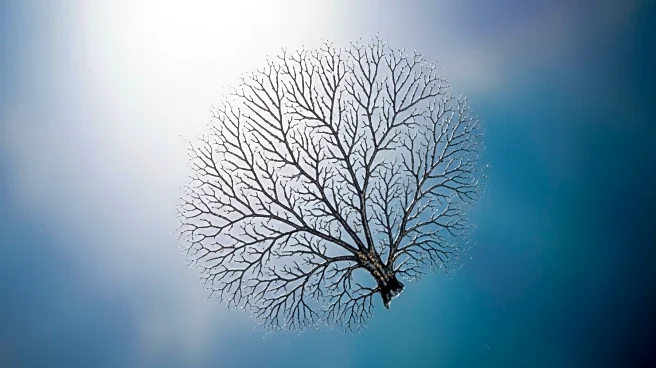What is the story about?
What's Happening?
Five European research institutions have announced an initiative to establish October 10 as International Coccolithophore Day. Coccolithophores are microscopic algae that play a crucial role in regulating Earth's climate by removing carbon from seawater and releasing oxygen. These organisms create calcite plates that sink to the ocean floor, forming chalk and limestone layers that record Earth's climate history. The initiative aims to draw attention to the vital contributions of coccolithophores to carbon regulation, oxygen production, and the health of marine ecosystems. The effort is led by the Ruđer Bošković Institute in Croatia, the Lyell Centre at Heriot-Watt University in the UK, NORCE Norwegian Research Centre, Marine and Environmental Sciences Centre at the University of Lisbon, and the International Nannoplankton Association.
Why It's Important?
Coccolithophores are among Earth's most effective natural carbon regulators, generating over 1.5 billion tonnes of calcium carbonate annually. They capture carbon dioxide from the atmosphere and store it in deep-sea sediments, playing a significant role in the global carbon cycle. Their ability to produce oxygen and nourish marine food webs is crucial for maintaining the planet's greenhouse balance. However, climate change poses serious risks to their survival, threatening the stability of ecosystems that depend on them. By designating a day for coccolithophores, scientists hope to raise awareness of their importance and inspire ocean literacy, policy focus, and public engagement.
What's Next?
The campaign to establish International Coccolithophore Day is a call to action for increased recognition of these organisms' role in the climate system. Scientists aim to inspire a new wave of ocean literacy and policy focus, emphasizing the importance of microscopic life in shaping the planet's future. The initiative seeks to change the way the ocean is perceived, highlighting the impact of the smallest organisms on the climate system.
Beyond the Headlines
Coccolithophores serve as both carbon pumps and climate archives, providing an exceptional geological record that allows scientists to study past climate shifts and predict future roles. Their interactions with viruses and grazers shape food webs and influence how the ocean stores carbon. By understanding coccolithophores, researchers uncover the living engine of the ocean's carbon balance, connecting microscopic processes to planetary climate stability.















